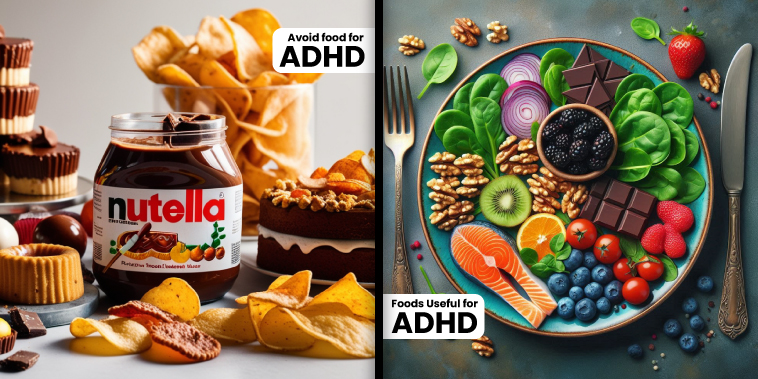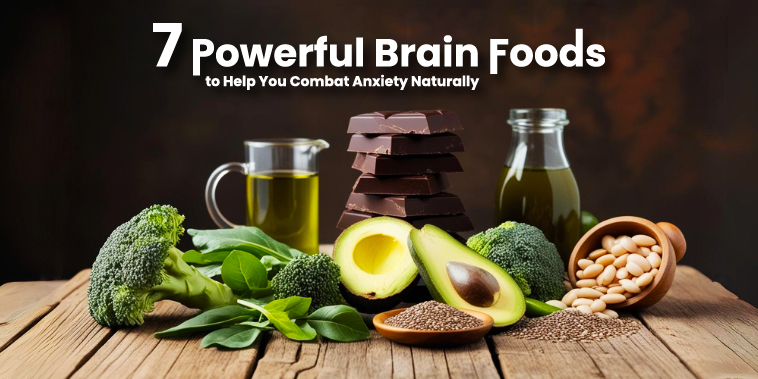Book Appointment Now

Dietary Strategies for Managing ADHD in Children: A Comprehensive Guide to Beneficial Foods and Those to Avoid
Introduction
Attention deficit hyperactivity disorder (ADHD) is a prevalent neurodevelopmental disorder characterized by symptoms such as inattention, hyperactivity, and impulsivity. Although medications and behavioral therapies are commonly used to manage ADHD, diet also plays an important role in reducing symptoms and promoting overall health. This blog post highlights nutritional strategies to help manage ADHD in children, focusing on beneficial foods and foods to avoid. Understanding these nutrients can provide valuable support for children with ADHD, complementing other therapeutic interventions.
Foods Useful for ADHD
Vegetables
Vegetables are rich in essential nutrients and fiber, which contribute to overall health and well-being. For children with ADHD, vegetables such as spinach, bell peppers and bell peppers can provide important vitamins and minerals. Leafy greens are especially beneficial because they are high in iron, which is important for cognitive function and focus.
Fruit
Fruits provide natural sugars, vitamins and antioxidants that support brain health. Berries, apples and bananas are great choices. Berries, such as blueberries and strawberries, are rich in antioxidants and vitamin C, which help reduce oxidative stress and support cognitive function. Apples and bananas offer a steady source of dietary fiber and energy, which can help stabilize mood and concentration.
Protein sources
Protein is essential for neurotransmitter function and brain health. Protein sources such as eggs, milk, lean meats, nuts, soy, and low-fat yogurt can support cognitive function and attention. Eggs and lean meat provide high-quality protein and essential amino acids. Nuts and soy are good plant-based options, which offer additional nutrients like magnesium and zinc. Low-fat yogurt is a good source of protein and probiotics, which may benefit gut health and, in turn, cognitive function.
Healthy fats
Healthy fats are essential for brain development and function. Fatty fish such as salmon, avocado, chia seeds, flaxseeds and tofu are excellent sources of healthy fats. Omega-3 fatty acids found in fatty fish are known to improve brain health and reduce inflammation. Avocado and chia seeds provide monounsaturated fats and essential fatty acids, which are beneficial for maintaining cognitive function and mood stability.
Complex carbohydrates
Complex carbohydrates provide sustained energy and stabilize blood sugar levels. Adding beans, lentils, peas, brown rice, oatmeal and whole grains to children’s diets can help maintain consistent energy levels and focus. These foods are high in fiber, which aids digestion and prevents blood sugar spikes and crashes that can affect mood and concentration.
Sources of B vitamins
B vitamins are important for brain health and neurotransmitter function. Foods rich in B vitamins, such as leafy greens, broccoli, and chickpeas, may support cognitive function and reduce ADHD symptoms. Leafy greens and broccoli are excellent sources of B vitamins, while chickpeas provide a plant-based option for increasing B vitamin intake.
Sources of zinc, iron and magnesium
Minerals such as zinc, iron and magnesium play an important role in brain function and behavior. Foods such as poultry, seafood, meat, nuts and soy are rich in these essential minerals. Zinc supports neurotransmitter function and cognitive development. Iron is important for oxygen transport and brain function, while magnesium supports mood regulation and relaxation.
Omega 3 fatty acids
Omega-3 fatty acids are known for their positive effects on mental health and behavior. Foods high in omega-3s, such as salmon, walnuts and edamame, may support cognitive function and reduce ADHD symptoms. Omega-3s help reduce inflammation and improve communication between brain cells, which can improve concentration and focus.
Avoid foods for ADHD
Sugar and syrup
Too much sugar can lead to fluctuating blood sugar levels, which can affect mood and behavior. Sugar and syrups should be minimized to prevent hyperactivity and maintain stable energy levels. Processed sugars can also cause mood swings and difficulty concentrating.
Sweets and candies
Sweets and candies often contain sugar and artificial additives that can negatively affect behavior and attention. These foods can cause blood sugar levels to spike and crash, exacerbating ADHD symptoms.
Sweetened breakfast cereals
Sweetened breakfast cereals are high in sugar and low in nutritional value. They can cause rapid spikes in blood sugar levels, which can negatively affect attention and behavior. Choosing whole-grain cereals with minimal added sugar is a better choice.
Cookies, cakes and pastries
Cookies, cakes and pastries often contain added sugar, unhealthy fats and artificial additives. These foods can lead to unstable blood sugar levels and lead to hyperactivity and difficulty concentrating. Choosing healthy breakfast options can help manage ADHD symptoms.
Processed foods
Processed foods, including snack foods and potato chips, typically contain unhealthy fats, sodium, and artificial additives. These foods can negatively affect brain function and behavior. Minimizing processed foods and focusing on whole, nutrient-dense options can support overall health and manage ADHD symptoms.
Conclusion
Nutritional strategies play an important role in the management of ADHD in children. Including a variety of beneficial foods, such as vegetables, fruits, sources of protein, healthy fats, complex carbohydrates, and those rich in essential vitamins and minerals, can support cognitive function and stabilize mood. Conversely, avoiding foods high in sugar, artificial additives, and unhealthy fats can help prevent ADHD symptoms from worsening.
While diet alone may not cure ADHD, it is an important component of a comprehensive management plan. Combining nutritional strategies with other therapeutic interventions can provide a comprehensive approach to managing ADHD and promoting overall well-being. Consultation with a health care professional or registered dietitian can further tailor dietary recommendations to meet the specific needs of a child with ADHD.



